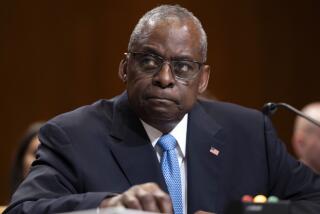U.S. Delays OK for Liberalizing Exports to East Bloc : Trade: Top Bush advisers won’t relax export restrictions on high-tech goods until the Soviet Union resolves the Lithuanian crisis.
- Share via
WASHINGTON — President Bush’s top advisers are withholding final approval of a plan to relax restrictions of Western exports of strategically sensitive goods to Eastern Europe and the Soviet Union until the Soviets resolve the Lithuanian secession crisis.
Sources here say Bush’s national security advisers, who are coordinating a high-level review of export policy, have tentatively decided to recommend rules enabling the Western allies to ship broad categories of computers and other high-technology goods to both areas. Current practice requires case-by-case approval by the Western allies.
However, officials say the White House will take no further steps--including formally notifying U.S. allies of its proposal--until the Soviet dispute with Lithuania is settled.
There are also some minor disagreements among various U.S. agencies over which specific products should be exempt from the lifting of current bans. Sources say the Commerce Department has been fighting to keep more strategic goods under license than other agencies want.
The disclosures came as, separately, a House Foreign Affairs subcommittee prepared to draft legislation today that would require the Administration to relax current restrictions for both Eastern Europe and the Soviet Union.
The policy that the Administration wants to apply to the Soviet Union and Eastern Europe would be similar to the structure that the allies have maintained for exports to China since 1985, when China was beginning to liberalize its economy.
Under the China plan, the Western governments have established a “green line” representing critical measures of technological sophistication. Products below those thresholds may be exported without case-by-case permission.
However, the Administration may seek to retain stiffer requirements for Eastern Europe and the Soviet Union--though still less stringent than those now in effect--on some categories of computers, machine tools and telecommunications equipment.
The Administration has been rushing to complete its proposal in time to present it to the other Western allies at a meeting in Paris of the 17-country Coordinating Committee on Multilateral Export Controls (Cocom) in June.
The United States has been under pressure from other Cocom governments that are seeking to take advantage of new markets in the newly emerging democracies in Eastern Europe and to profit from the thaw in Western-Soviet relations.
Some U.S. officials fear that unless the United States acts quickly, some European members may bolt, and Cocom could collapse. The agency, based in Paris, administers the export control program for member governments.
Top Administration policy makers ordered the high-level review earlier this year after U.S. representatives to the last Cocom meeting, on Feb. 16, returned with a recommendation that the United States move quickly toward relaxing current regulations.
Just after the Feb. 16 meeting, U.S. officials said they would prepare for gradually liberalizing restrictions on a wide variety of previously controlled items. They also announced a high-level interagency review of overall U.S. export-control policy.
Cocom regulations deal with a variety of high-technology products ranging from computers and telecommunications equipment to semiconductors, test equipment, machine tools, measuring devices and some transportation equipment.
Cocom bans the export of some kinds of equipment and grants export licenses for others on a case-by-case basis. Under the proposal being considered by the Bush Administration, items that fall below the green line would not require export licenses. Exporters would merely notify Cocom of the sale.
More to Read
Get the L.A. Times Politics newsletter
Deeply reported insights into legislation, politics and policy from Sacramento, Washington and beyond. In your inbox twice per week.
You may occasionally receive promotional content from the Los Angeles Times.










